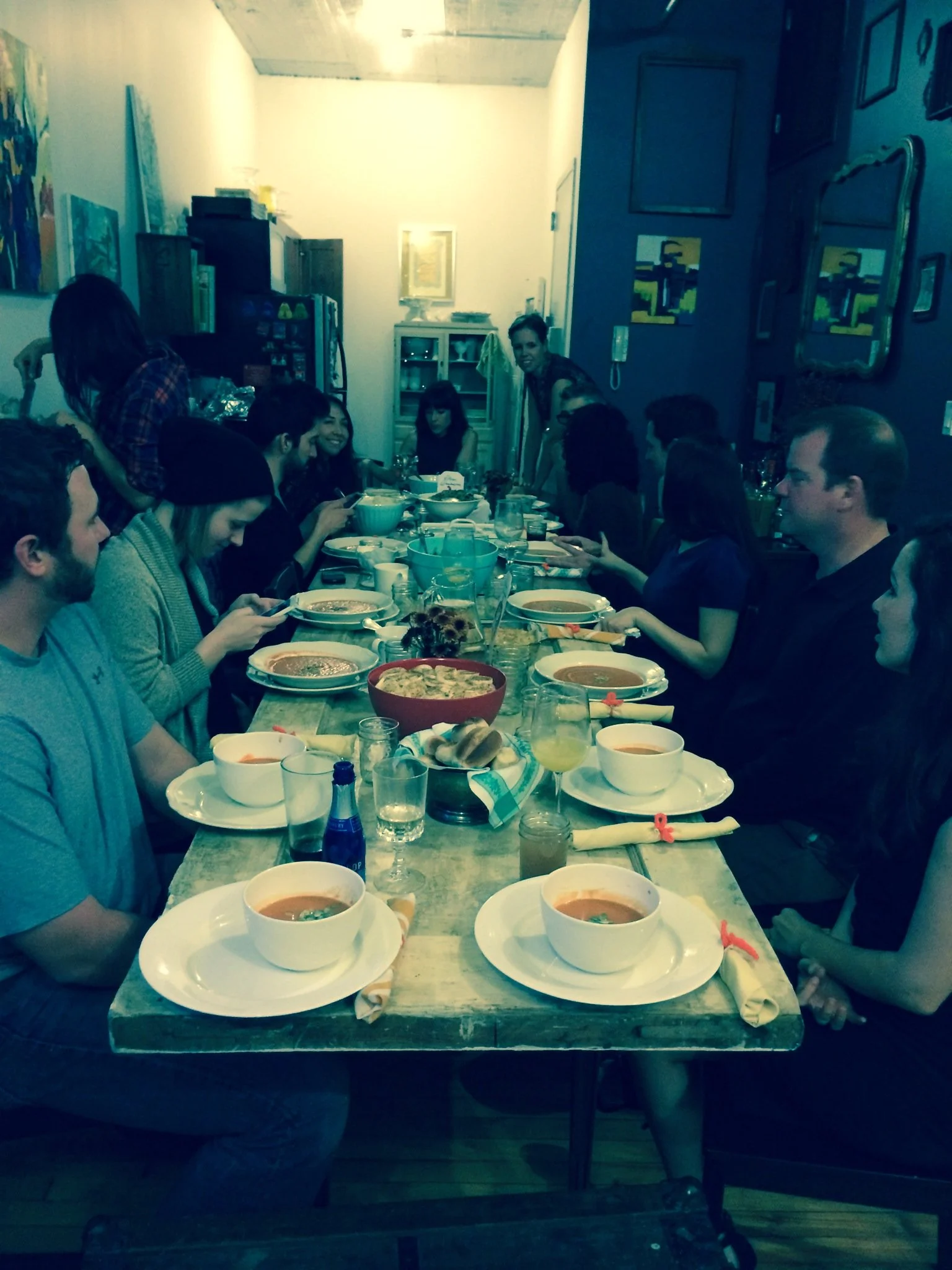Imperfect Gatherings
Creating New Traditions:
In my late 20s, I decided to start hosting Thanksgiving in my NYC apartment. At first, it was an experiment, hosting a few close friends in my limited space, gathering around tables that seemed much too small, often perched on mismatched chairs. But over time, this get-together transformed from a casual gathering to a valued tradition. Each year, friends would bring other friends, and we would fill up my loft apartment in Bushwick (back when lofts in Bushwick were affordable but lacked certificates of occupancies), laughing, sharing stories, and making toasts. There was something about these gatherings that felt important, especially to those of us who shouldn’t or couldn’t be with our families of origin for any number of reasons.
Of course, these dinners were far from perfect. There was always a bit of chaos, a burnt turkey (or maybe a few, I’m a vegetarian, not my strong suit); my cat knocking over a pumpkin pie and eating it (he was fine), and so many dishes. These mishaps turned into the memories we’d recount every year including the new people in on the jokes.
Thanksgiving 2010? An old door as a table extender.
No matter the size of the group, we’d go around and share something we were thankful for. Even when the guestlist reached upwards of 20, we would carefully go to each person and listen while we watched our food get cold. These moments, while not exactly original, were heartfelt and sincere. Somehow, that gratitude almost always boiled down to being part of something, feeling included, and simply having a place to be. I survived. I am here right now. We are together.
Thanksgiving became less about the idealized vision and more about what we created together. Our gatherings allowed us to reimagine what a holiday could mean, filling it with pieces of our own values, our cultures, and our personalities. They allowed me to discover what mattered to me about gathering, tradition, community, and family. My guests also were able to share parts of themselves and their culture as we wove together a new ritual. Looking back I can see all of the little repairs, and lasting connections that brought comfort at a time when we are often inundated with images of “ideal families”. It became clear that traditions don't have to be inherited; they can be created, from scratch, around an old farm table in Bushwick.
Axle holding down the fort before guests arrive in 2018.
There is no "right" way to celebrate. Maybe you'll gather with family or spend it solo at a meditation retreat, taking a break from the everyday stresses. You could consider volunteering, which I did many times before I began hosting myself. There are countless organizations across the city that welcome help on Thanksgiving, offering a meaningful way to spend the day. Or, maybe you'll take part in a Turkey Trot for some light-hearted exercise or even try your hand at hosting.
However you celebrate—whether with family, friends, or solo—may you find gratitude in the present moment, surrounded by those who choose to share it with you.
Money Trouble?
In psychotherapy circles, particularly in the context of couples therapy, there is a saying that goes, "It's not really about the money or the sex." This means that while money and sex are often the surface issues that couples argue about, they usually symbolize deeper, underlying problems within the relationship. These big topics often hold significant meaning beyond their immediate context. For instance, arguments about money can reflect deeper issues such as power dynamics, trust, security, or differing values and priorities.
This is especially true when it comes to an individual’s relationship with money. While money itself can be useful, it’s what money represents or symbolizes that holds significant importance. According to the American Psychological Association (APA), money has been a top stressor for Americans since 2007, and in 2020, the APA identified it as a risk factor in the nation’s mental health crisis. For many, money carries a heavy emotional weight, often triggering past anxieties or even resurfacing traumatic memories.
So what does money mean to you?
In one of Suze Orman's first books, The 9 Steps to Financial Freedom, she introduces a powerful exercise that involves picturing your first memory of money.
"So the first step toward financial freedom is a step back in time to the earliest moments you can recall when money meant something to you, when you truly understood what it could do. When you began to see that money could create pleasure--ice-cream cones, merry-go-round rides; and also to see that it could create pain--fights between your parents, perhaps, or longings of your own that couldn't be fulfilled because there wasn't enough money or even because there was too much. When you first understood that money was not just a shiny object or something to color on. When you understood that money was money. I want you to think back and see that your feelings about money today (fearing it, enjoying it, loving it, hating it) can almost certainly be traced to an incident, possibly forgotten until now, from your past."
She goes on to encourage people to ask themselves some reflective questions:
What were the best presents you recall receiving when you were a child?
Did your friends have things you didn't?
Did your mother have to work when others didn't, or not have to work when others did?
Did you get money every time you went to see your grandparents?
Were you ashamed to bring your friends home to your house?
What were the special treats of your childhood? Did you have to be good in order to earn them?
Did you feel like your friends had nicer clothes than you did? Did your friends' parents have more expensive cars than yours did?
Did you feel ashamed of having far more than your friends did?
Did you hear your parents fight about money?
Did you receive only money as gifts, instead of the personal touch of a handpicked present?
Did your mother close the windows when she bought something because your father would yell and she didn't want the neighbors to hear? (Mine did.)
Was shopping for school clothes a ritual you looked forward to every year?
Did you steal--from piggy banks, your parents' wallets, the dime store?
Do you remember the very first wallet you ever had? Was it given to you empty, or with a penny in it, or a dollar?
Did you get less of an allowance than your friends or siblings? Did you have to work for it, or was it given to you as your right? What did you do with it--spend it? save it?
What is the biggest amount of money you ever saw as a child?
Did you get money for birthdays? Did someone tell you what to do with it?
Did your friends go on better vacations than you?
What did your parents tell you about money that made you feel good? That made you feel bad?
While doing this, also tune into how you’re feeling in the moment. What emotions are surfacing? What physical sensations are you noticing? These feelings might be familiar to you, connected to past experiences.
If it feels right, try drawing what’s coming up for you. What do you notice about the imagery you create? This process can offer deeper insights into the emotions and sensations that may be over-coupled with your thoughts about money.
In Somatic Experiencing, we talk about coupling dynamics, which often arise as a result of exposure to overwhelming experiences—the root of trauma. We typically categorize coupling into two types: over-coupling and under-coupling.
Over-coupling occurs when two elements become linked (or coupled) within a traumatic experience that shouldn't be inherently connected. For instance, an emotion or sensation may become automatically associated with a specific trigger, like money.
Take a moment to reflect: Is there an emotion or sensation that immediately comes up when you think about money? This could be an example of over-coupling. When you think back to your earliest memories, do you notice any ways in which you might have attached feelings of fear or safety to money?
By exploring these coupling dynamics and paying attention to the emotions and sensations that arise, you can begin to untangle the connections that may be influencing your relationship with money. This awareness is a crucial step in healing, allowing you to separate past traumas from present experiences. As you reflect, visualize, and even create imagery around these feelings, you gain a deeper understanding of how your past might be shaping your present. This process empowers you to move forward with greater clarity, intentionality, and emotional freedom.
The Therapeutic Investment
Money is emotional. How we feel about it, our relationship to it, and what that all says about us is integral to our identities. Therapy is a significant financial commitment - an additional weekly expense added to our other financial obligations. It is no wonder that starting therapy can bring up a lot of complicated emotions about money (and ourselves).
Therapy = money + time that we are spending on ourselves in order to improve our lives in the future. In the most traditional sense, therapy is an investment we make in ourselves.
Therapy offers a safe, confidential space where we can openly express what is otherwise difficult to share and gain clarity. It is a process that fosters self-awareness, encouraging reflection in a non-judgmental setting. Therapy addresses underlying issues that, when left unattended, often lead to high costs in the future. Issues like anxiety, depression, and trauma can all manifest in ways that impact relationships, physical health, and work. A recent Yale analysis finds that untreated mental illness costs the US economy $282 billion annually. $282 billion. On an individual level, unaddressed mental health issues lead to lost wages, medical bills, substance abuse and so on. By addressing underlying issues proactively through therapy, we can prevent some of these costs and improve overall quality of life.
Therapy offers a safe, confidential space where we can openly express what is otherwise difficult to share and gain clarity. It is a process that fosters self-awareness, encouraging reflection in a non-judgmental setting.
Therapy helps us manage daily life stressors and emotional issues that can lead to improved performance at work and career advancement. Many of us find that through therapy, we are better equipped to manage stress, communicate effectively, and navigate workplace challenges. These skills are invaluable in any line of work and can lead to increased job satisfaction, higher productivity, and the potential for promotions or raises. As such, the financial investment in therapy can directly contribute to earning potential, making it not only a personal growth tool but also a strategic career investment.
Therapy also helps us grow in our relationships with others. Healthy relationships are key to overall happiness and healing from the effects of trauma. Unexamined and unresolved issues around interpersonal interaction often strain relationships in our personal and professional lives. It leads to conflict, misunderstanding, and the dissolution of relationships. Often the pattern of these relational issues leads to financial losses, be it job loss, divorce, or strained family dynamic. By investing in therapy we can foster resilience and the ability to cultivate emotionally rewarding relationships that often have financial benefits as well.
Ultimately, therapy is an investment in self and when we prioritize ourselves, we can be better in the other areas of our lives. Investing in therapy not only addresses any immediate concerns but gives us the tools we need for personal growth and a more fulfilling and wealthy life.





